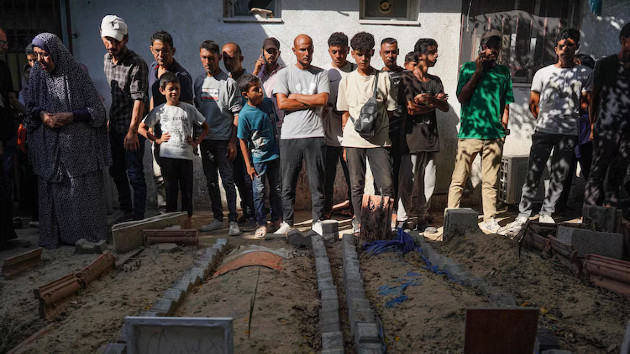People stand by the tombs of a family members after corpses were unearthed from temporary graves at the al-Amal hospital in Khan Yunis in the southern Gaza Strip and handed over to their families for burial, on July 18, 2024. (Bashar Taleb/AFP via Getty Images)
(NEW YORK) — Israel’s war in Gaza has hit another grim milestone after the Hamas-run Health Ministry in the strip declared that the death toll had passed 40,000 since the start of the war on Oct. 8.
On Thursday officials in Gaza said a total of 40,005 people had been killed in the conflict.
That figure does not distinguish between civilians and combatants. However, Gaza’s Hamas-run Health Ministry said there were more than 11,000 women and more than 16,000 children among the dead.
Israel launched its war in Gaza on Oct. 8, the day after Hamas carried out a surprise terror attack in southern Israel, killing around 1,200 people, including women and children.
The true death toll in Gaza, after more than 10 months of war, could be significantly higher than the Health Ministry’s figure because officials in Gaza estimate that an additional 10,000 people in Gaza are unaccounted for because of the war.
Casey Harrity from Wyoming, who is working in Gaza for the non-governmental organization Save the Children, agrees that the true death toll from the war is “far higher.”
Harrity, who is the NGO’s Team Lead in the strip, said Israel’s military operations over the past 10 months had “squeezed” the population of Gaza “into an incredibly small area.”
In recent days, the IDF has been dropping leaflets in the city of Khan Younis in the south of Gaza, warning civilians to relocate ahead of military operations. The Israel Defense Forces tactic of moving civilians has been commonplace throughout much of the war, meaning many Gazans have been displaced multiple times and much of the civilian population now lives in large encampments made up of tents.
“Every available part of land is taken up by tents,” Harrity told ABC News during a videolink interview from her office in Gaza.
“The population doesnt have toilets. They dont have running water. Theyre living in incredibly dire situations. And were seeing outbreaks of disease in these shelters and camps. Were seeing truly horrifying conditions,” she said.
Harrity said she hears “bombardments, every night” in Gaza. But she said she was “lucky” to be sleeping in a building.
“The vast majority of the population is living outside. They have nowhere safe to go,” she added.
ABC News also spoke to Ghada Al-Haddad, a Palestinian in Gaza working for British-based non-profit Oxfam.
She described how people in Gaza live in constant fear and families often congregate in the same place at night because they would rather be killed together than risk mourning the death of their loved ones.
“When you go to bed, you are not sure you are going to make it to the morning,” Al-Haddad said in an interview with ABC News.
U.N. schools in Gaza were deemed to be “safe spaces” where displaced Palestinian families could shelter.
However, the United Nations Human Rights Office said “at least” 21 schools in Gaza have been targeted by the IDF since early July.
The IDF has accused Hamas of “systematically” hiding and operating from within schools.
However, Al-Haddad said it was now clear that Gaza’s schools “are no longer safe.”
Both Harrity and Al-Haddad spoke of the suffering of Gaza’s children.
Al-Haddad, from British charity Oxfam, said many children in Gaza today are so used to the brutality of war that they can now distinguish between the noise of an Israeli airstrike or an Israeli artillery shell exploding.
She said many children have to walk miles to fetch water for their families or to find wood so they can make a fire to cook.
“This war is … very severe, very brutal and it doesnt … come to an end,” said Al-Haddad.
Casey Harrity from Save the Children said innocent bystanders are constantly caught up in the crossfire of the war.
“Children are impacted more with their small bodies. When a blast like that goes off, theyre thrown farther, theyre thrown faster, their bones bend and break,” Harrity told ABC News.
“So children really are the largest victims in this war,” she added.
The IDF has said it takes multiple measures, like the use of high-precision weaponry and intelligence, to minimize civilian casualties.
Copyright © 2024, ABC Audio. All rights reserved.



